Australia is famous for its beaches, wildlife…and the occasional quirky law. It’s no surprise that tourists sometimes ask, “Is it illegal to wear shoes in Australia?” The question sounds odd, but social media myths about Aussie footwear rules have been circulating for years.
We’ll separate myths from reality about shoe laws, look at some genuinely weird Australian clothing rules, and compare them with unusual footwear regulations around the world.
Is It Illegal to wear Shoes in Australia? Weird Myths and Footwear Laws Explained
There is no such law that prohibits you from wearing shoes in Australia. They do have some weird myths and footwear laws which seem to be funny and confusing.
Let’s take a deep look at them-
1. Is It Actually Illegal to Wear Shoes in Australia?
Short answer: No. Wearing shoes in Australia is completely legal. There is no federal or state law that bans or mandates footwear in public spaces. Australians freely choose between shoes, sandals, or going barefoot depending on the weather, culture, or personal comfort.
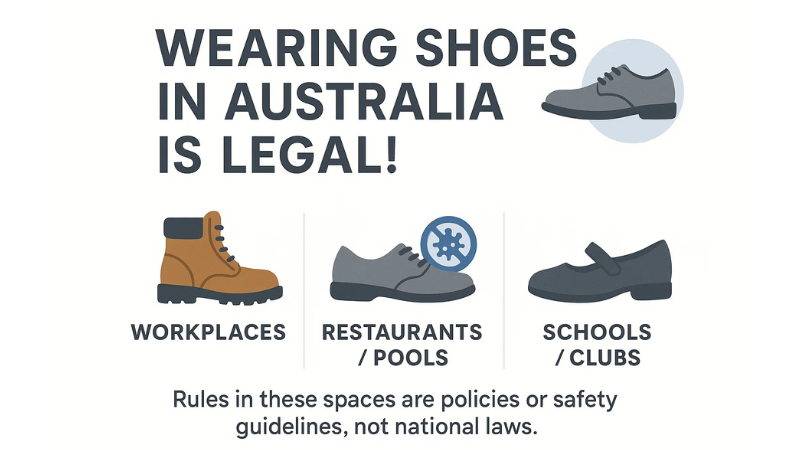
The only time you’ll encounter specific footwear requirements is in private or regulated spaces such as:
- Workplaces:
Construction sites, factories, and hospitals often require enclosed or protective shoes for safety under occupational health and safety rules.
- Restaurants or Swimming Pools:
Some venues ask guests to remove shoes or wear appropriate footwear for hygiene or liability reasons.
- Schools or Clubs:
Individual institutions may have dress codes, but these are policies—not criminal laws.
In short, there is no law making it illegal to wear (or not wear) shoes in public in Australia. Any rules you see about footwear are local policies or safety guidelines, not national legislation.
2. Weird Australian Laws About Clothing
Australia does have a reputation for some quirky or outdated rules about what people can wear in public. However, most of these “laws” are either historical, very specific to certain places, or no longer enforced. Still, they make for interesting reading. For example:
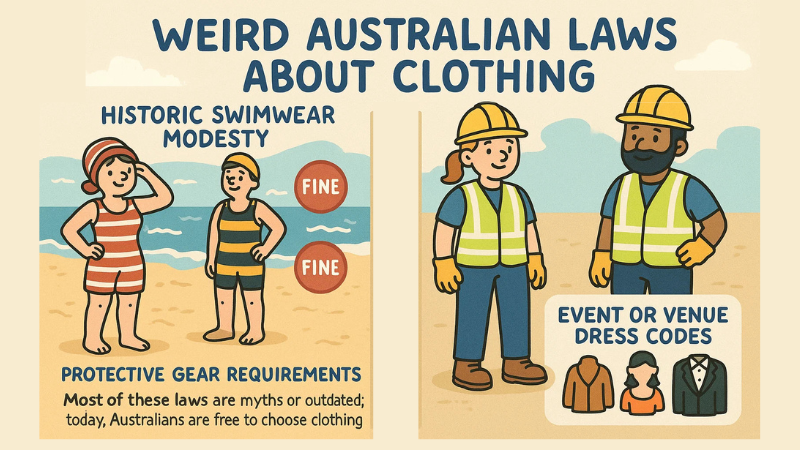
- Historic Swimwear Modesty Rules:
In the early 20th century, some Australian beaches required men and women to wear full-body bathing costumes or risk fines. These rules were abolished decades ago, but they’re still mentioned in “weird law” lists.
- Protective Gear Requirements:
Modern workplace regulations often require hard hats, high-visibility vests, or steel-toe boots on construction sites. These are about safety compliance under occupational health and safety standards, not general dress codes.
- Event or Venue Dress Codes:
Certain public events, clubs, or government buildings may ask for specific attire (like shoes or covered shoulders) for safety or decency reasons. These are policies, not criminal laws.
Most so-called “weird Australian laws about clothing” you’ll see online are myths or outdated ordinances. Today, Australians are generally free to choose their own clothing and footwear in public, with only specific venues or workplaces setting their own dress requirements.
3. Is It Illegal to Go Barefoot in Public?
One of the most common myths about Australia is that going barefoot in public is somehow against the law. In reality, there is no federal or state law banning people from walking barefoot in public places. In many coastal towns, it’s normal to see people barefoot at the beach, in parks, or even popping into local shops.
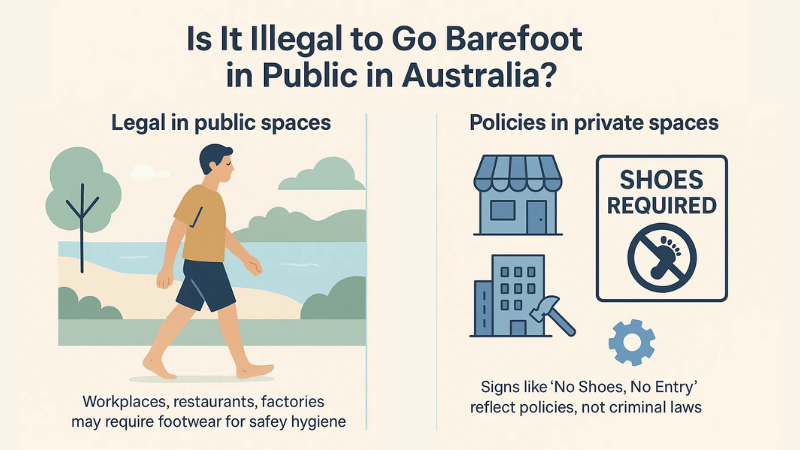
However, there are a few important points to understand:
- It’s Legal, but Not Always Allowed Everywhere:
While walking barefoot in public spaces is legal, private businesses or venues can set their own rules. Signs like “No Shoes, No Entry” reflect a policy, not a criminal law.
- Workplace & Safety Regulations:
Workplaces, restaurants, factories, and construction sites can legally require footwear for safety or hygiene reasons under occupational health and safety rules. Breaking those rules might get you refused entry or even fined by your employer, but it’s not the same as breaking a public law.
- Social & Practical Considerations:
Even though it’s legal, some people might find it unusual outside of beach towns. You also risk injury from hot pavements, glass, or sharp objects.
In short, it’s perfectly legal to go barefoot in public in Australia, but individual businesses and workplaces may still require shoes for safety or hygiene reasons.
4. Funny Myths About Shoe Laws in Australia
Australia seems to attract all sorts of quirky rumours online, and shoe laws are a favourite topic. Over the years, travel blogs, memes, and even some guidebooks have repeated strange claims that make visitors wonder if they’re breaking the law with their footwear.
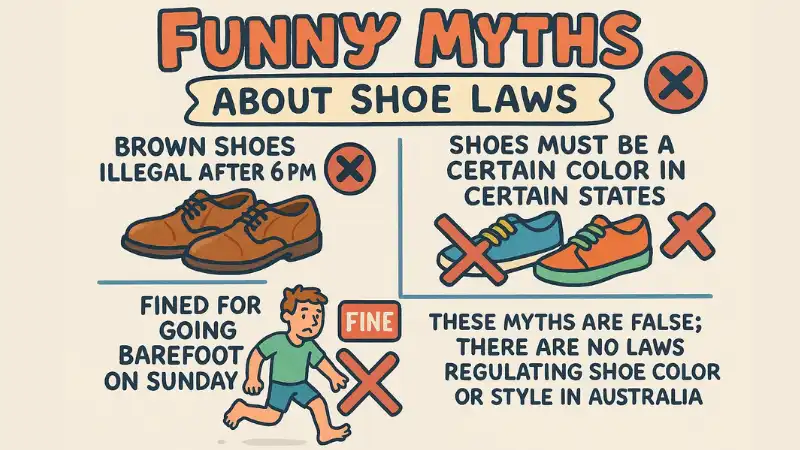
Common examples include:
- “It’s illegal to wear brown shoes after 6 p.m.”
- “You must wear shoes of a certain colour in certain states.”
- “You can be fined for going barefoot on a Sunday.”
These “rules” sound entertaining, but none of them are actually true. They’re either:
- Urban legends created for clicks or laughs.
- Exaggerations of old bylaws that were repealed decades ago.
- Misinterpretations of workplace or venue policies (like restaurants requiring shoes).
In reality, there are no Australian laws regulating the colour or style of your shoes, and certainly no fines for being barefoot on a particular day. These myths survive because they’re funny, but they’re not grounded in any current legislation.
5. Unusual Footwear Rules Around the World
While Australia’s “shoe laws” are mostly myths, some parts of the world really do have formal or cultural footwear rules. They’re rarely criminal offences, but they can catch travellers off guard if you’re not aware:
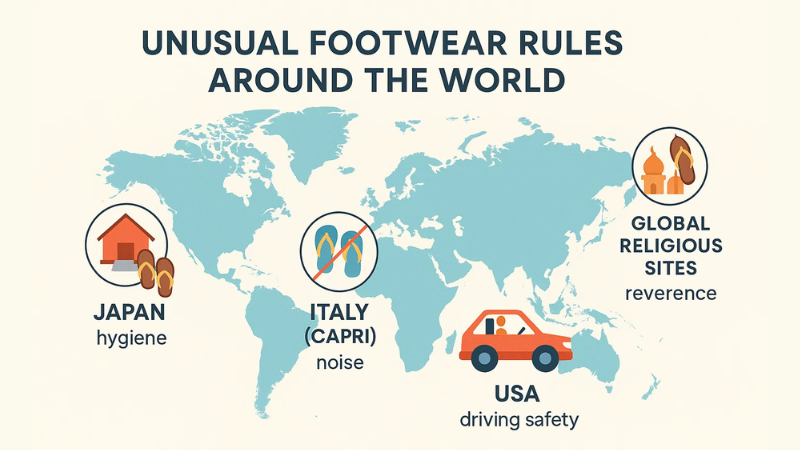
- Japan – Shoes Off Indoors:
In many Japanese homes, temples, schools, and traditional restaurants, you’re expected to remove your shoes at the entrance. Clean indoor slippers are often provided. This isn’t a law but a deeply rooted cultural practice tied to hygiene and respect.
- Italy (Capri) – Noisy Flip-Flops:
The island of Capri famously introduced local noise restrictions targeting clattering wooden clogs and loud flip-flops on certain streets. While more symbolic than strictly enforced, it highlights how even footwear sounds can be regulated for public peace.
- United States – Shoes While Driving:
Some U.S. states and cities have bylaws that technically require drivers to wear shoes while driving for safety reasons. Although tickets are rare, the idea is that barefoot driving can reduce control of the pedals in an emergency.
- Religious Sites Worldwide:
From mosques in Turkey to Hindu temples in India, removing shoes before entering a sacred space is a common requirement. Here, footwear rules are about reverence and cleanliness rather than legal penalties.
These examples of unusual footwear rules around the world show that most regulations are about etiquette, safety, or tradition rather than criminal law—just like in Australia. And though they seem a little odd, they are actually making your shoes last longer in a way.
6. Are There Dress Codes and Footwear Rules in Australia?
Many visitors and even locals sometimes wonder if Australia has laws dictating what people can wear. The truth is, Australia does not have nationwide dress code laws for the general public.
Clothing and footwear rules are mostly determined by private policies, workplace requirements, or safety regulations rather than legal mandates.
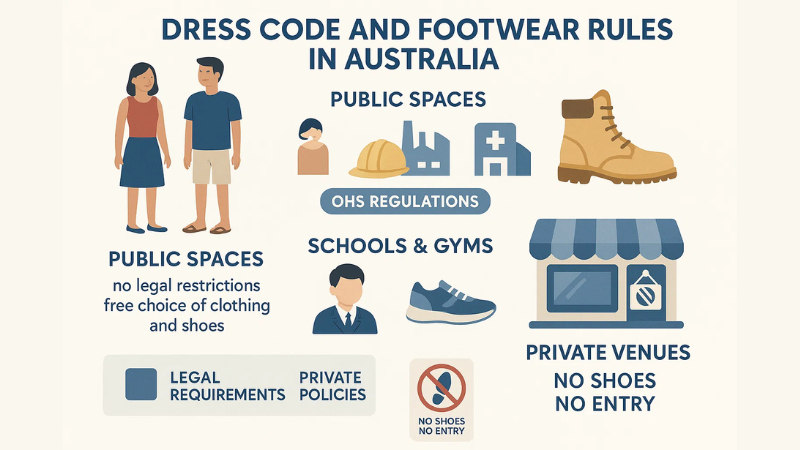
Workplaces and Job Requirements
Employers in Australia can set clothing and footwear standards to ensure safety, hygiene, and professionalism. For example:
Certain jobs legally require closed-toe shoes or protective footwear. This includes:
- Construction sites (steel-toe boots)
- Factories or warehouses (slip-resistant, protective shoes)
- Hospitals or laboratories (non-slip, hygienic footwear)
- Uniforms and Branding:
Restaurants, hotels, and retail stores often enforce dress codes to maintain a consistent professional image. While employees may be required to wear specific shoes or uniforms, failing to comply usually results in workplace disciplinary action—not legal penalties.
Schools, Gyms, and Public Facilities
Some schools and gyms also have clothing standards, though these are institutional rules rather than laws:
- Schools may require uniforms or closed shoes for safety during sports and lab activities.
- Gyms often request clean athletic shoes to protect equipment and flooring.
- Public pools and recreation centers may prohibit certain footwear for hygiene reasons.
Restaurants, Stores, and Private Venues
Private businesses can refuse service to patrons who do not meet their dress code standards:
- Signs like “No Shoes, No Entry” are common in cafes, restaurants, and retail outlets.
- These rules are enforced as part of the establishment’s policy and hygiene standards, not by criminal law.
Safety vs. Legislation
It’s important to differentiate between legal requirements and safety policies:
- While OHS regulations legally mandate protective footwear in certain workplaces, the general public is free to choose footwear in public spaces.
- Refusal of service in shops or restaurants is a private decision and does not equate to a law.
Tips for Visitors and Residents
If you’re unsure what’s acceptable in a specific place:
- Look for posted dress code or footwear policies.
- Ask employees or management in advance if you’re planning to enter a private venue.
- Bring versatile footwear if you plan to visit workplaces, restaurants, or recreational facilities where shoes may be required.
Key Takeaway: There are no criminal laws in Australia requiring shoes or enforcing dress codes in public, but rules do exist in private spaces and workplaces for safety, hygiene, or professional reasons. Understanding the difference helps you stay comfortable, legal, and respectful of local policies.
Conclusion
Wearing shoes in Australia is not illegal, and going barefoot is generally fine in public. The only exceptions are workplaces or venues with their own safety or hygiene policies. While Australia has had some quirky clothing regulations, most are myths or outdated ordinances.
If you’re visiting or moving to Australia, relax — you can wear whatever shoes you like (or none at all) unless a venue’s dress code says otherwise.
FAQs
Can I go barefoot in public in Australia?
Yes. There is no law against being barefoot in public spaces, but private venues can set entry rules.
Are there states with strict footwear rules?
No state bans or mandates footwear for the general public. Any rules you see are workplace or venue policies.
Do restaurants enforce shoe rules legally?
They can refuse entry for hygiene or safety reasons, but you’re not committing a crime by being barefoot outside.
Are there penalties for not following dress codes?
Only in regulated environments (e.g., job sites) could you face work penalties or fines, not criminal charges.
What are some of the funniest clothing laws in Australia?
Most “funny” laws are outdated myths. Current regulations are mostly about safety equipment, not everyday clothing.

Leave a Reply